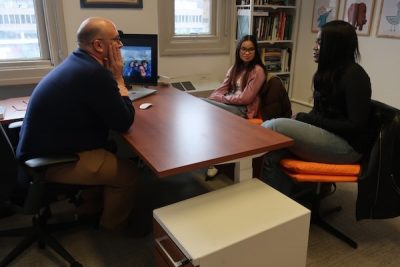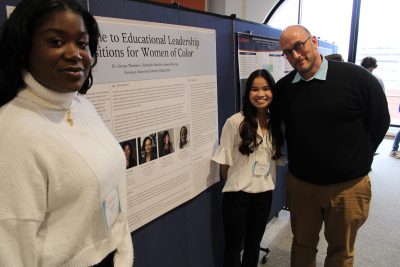Through a Syracuse University funded research project, undergraduate School of Education (SOE) seniors Denaysha Macklin ’25 and Emma Wareing ’25 are continuing research to investigate barriers women of color face in advancing from K-12 teachers to school leaders.
The project—called “Pipeline to Educational Leadership Positions for Women of Color,” now in its fifth year—utilizes qualitative interviews with minority women who serve or have served as district-level administrators, examining the adversities they have overcome in obtaining their positions.
Timely Research
Both Macklin and Wareing earned a Syracuse University Office of Undergraduate Research and Creative Engagement (SOURCE) fellowship after SOE Professor George Theoharis encouraged them to apply. The pair started their research over summer 2024 with guidance from Theoharis, who has been a SOURCE advisor since the project began.
SOURCE offers a range of programs to foster and support undergraduate participation in faculty-guided scholarly research. Since summer 2021, 12 SOE faculty have mentored undergraduates through SOURCE grants and programs. Director Kate Hanson says student participants build research skills, learn to design and revise projects, present their work, and produce timely contributions to their discipline.
“[SOURCE students] are able to connect their knowledge from their own education to innovative and cutting-edge research.”
SOURCE Director Kate Hanson
“They are able to connect their knowledge from their own education to innovative and cutting-edge research,” Hanson says, noting that SOE students can use their new understanding of the broader landscape in their future classrooms and educational leadership roles.
The student pair began their part of the project by reviewing previous years’ transcripts before connecting with educational leaders to request and conduct interviews over the spring 2025 semester. “Using qualitative methods allows us to fill the gap of literature that highlights these shifts to leadership roles,” Theoharis says.

Each year, students have sought to speak to at least two women each, conducting two-part interviews to inquire about career experiences, paths, and transitions to administration, as well as racial and gender barriers they faced. As the project continues, with future undergraduate researchers adding more first-person accounts, Theoharis says at some point all the interviews will be combined and published.
Inspirational Women
In the near future, Wareing and Macklin will join Theoharis to present findings at the American Education Research Association conference taking place April 23 to 27 in Denver, CO.
“AERA is the biggest, most prestigious education research conference,” Theoharis says. “Since Emma and Denaysha are focused on school leaders, they will present in the division on administration and leadership, sharing the project with researchers, faculty, and doctoral students.”
At past conferences, students’ research was well received. “It’s typically not a space for undergraduates, so when attendees hear from them, they’ve been very impressed,” Theoharis says. “And I’ve been pleasantly surprised several times how gender and racially affirming the space has been for our students.”
Theoharis notes that the presentations overwhelmingly attract women of color whose own experiences resonates with students’ findings. This, he says, helps the young researchers see a potential future in such spaces, affirming that they can belong.
“Because our students consistently get these grants, it says the School of Education has undergraduates who are engaging in serious research.”
Professor George Theoharis
Macklin says she’s learned this affirmation firsthand. “I don’t remember having a Black woman as a teacher, let alone leadership,” recalls the Bronx native, who says that while all her classmates looked like her, her teachers were primarily white women. “Now getting to talk to people who were in these positions and still are, it makes me able to see myself there, whereas before I couldn’t really see myself doing anything more than being a teacher.”
A goal of the project is to document the stories and experiences of women of color because, Theoharis says, too often teachers don’t reflect the diversity represented in the student body. Within school administration, he adds, there is an even more disproportionate lack of minority women.

“Part of the research is to understand their experiences,” says Theoharis, noting students use a critical race theory framework and incorporate the idea of counter narratives, listening to the voices of marginalized processionals. Those interviewed are specifically asked about barriers they’ve faced, around sexism and racism.
A surprising theme Macklin discovered in her interviews is resilience: “They are such inspirational women and have so many lessons to share. Hearing their stories and hearing how positive they still are is motivating.”
Intergenerational Sharing
Wareing says the project also has helped her imagine herself, an Asian woman, in such roles: “I can finally see myself there—in actuality, not just in theory.” Wareing, who grew up on Long Island, said that like Macklin, she had little exposure to non-white teachers or administrators.
For her interviews, Wareing chose to focus specifically on Asian women, who she says shared that their experiences with forms of oppression were often less explicit than what past interviewees shared. “But racism did play a factor and impacted how they carried themselves in these positions because of Asian stereotypes and expectations placed onto them,” Wareing shared. Additionally, her subjects spoke about being immigrants and growing up and being educated with different cultural norms and how each impacted their leadership styles.
The students’ personal and professional realizations are a key benefit of the SOURCE fellowship, Theoharis says: “It connects them with people in the field and helps sets their sights on potential leadership roles. The intergenerational sharing is a really nice part of this.”
“They are such inspirational women and have so many lessons to share. Hearing their stories and hearing how positive they still are is motivating.”
Denaysha Macklin ’25
In addition to introducing undergraduates to research, SOURCE provides a financial benefit by paying an hourly rate for the work and funding conference travel. “And it raises the profile of our students and School,” Theoharis adds. “Because our students consistently get these grants, it says the School of Education has undergraduates who are engaging in serious research, just like other students across campus. Our School can do research at the highest level.”
The project’s original premise developed from a proposal made to Theoharis by Jenny Gines ’21, now an eighth-grade teacher. Previous student researchers included SOE alumnae Ashanti Hunter ’22, Michelle Ho ’22, Savannah Stocker ’23, Emily Peterson ’23, Amanda Feliz ’24, and Kamille Montgomery ’24.
Looking ahead, Theoharis says SOURCE applications were submitted this past winter by juniors Vera Wang ’26 and Eliani Jimenez Merino ’26, who will start their part of the research endeavor in summer 2025.
Thinking of the time when all the “Pipeline to Educational Leadership” interviews are curated into a publication, Macklin says she hopes such a collection can inform widely on barriers to professional growth and help remove them: “I feel the project’s goal is to identify the problems. Then we can expose those problems and attack them before they become a problem for the next generation.”
By Ashley Kang ’04, G’11 (a proud alumna of the M.S. in Higher Education program)
